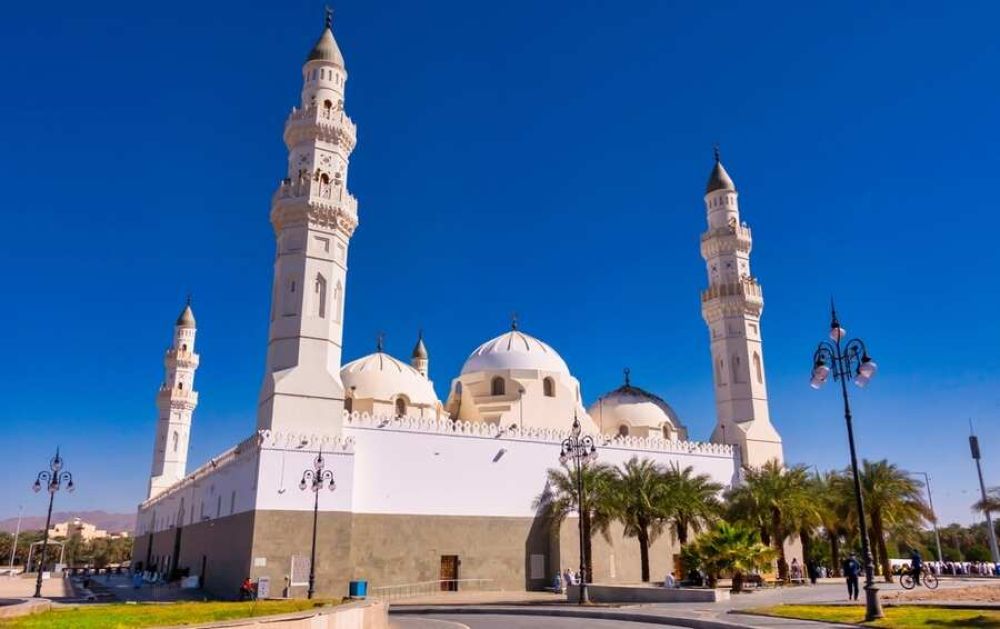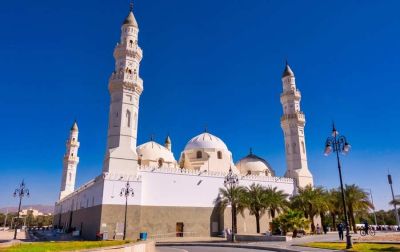

Quba Mosque, situated in the outlying environs of Medina, holds the significant distinction of being the first mosque built in the history of Islam. Visitors can delve deeper into the rich tapestry of Islamic history by engaging in a guided tour of this sacred site. The tour provides comprehensive insights into the mosque's construction, which dates back to 622 AD, when the Prophet Muhammad laid its foundation upon his emigration to Medina. Participants will explore the mosque's impressive architecture, which has been expanded and renovated throughout the centuries to accommodate the growing number of worshippers. Guides will relay captivating anecdotes about the mosque's importance, highlighting how the Prophet himself would visit every Saturday and pray two rak'ahs. Learning about the deeply-rooted traditions and observing the devout in prayer offers a poignant glimpse into the spiritual heart of Islam.
Quba Mosque is not only admired for its historical significance but also revered as a place of worship, where thousands of pilgrims and local Muslims perform prayers. Embarking on a prayer experience allows visitors to partake in the serene and communal act of worship. According to Islamic tradition, offering two rak'ahs of nafl (voluntary prayers) in Quba Mosque is reward equivalent to performing one 'Umrah. With this sacred belief in mind, participants of the prayer experience will find exceptional tranquility and spiritual upliftment within the mosque's hallowed halls. The opportunity extends beyond the five daily prayers to include Friday congregational prayers, which attract an especially large number of worshippers. Visitors are advised to dress modestly and observe the customs of the mosque, immersing themselves in an act of devotion that transcends time and unites the community.
Quba Mosque serves as an educational hub for those keen on understanding Islamic heritage and the mosque's role in the evolution of Islamic culture. Interested individuals can engage in various education sessions offered on-site, often formatted as lectures or interactive classes. These sessions are conducted by knowledgeable scholars who expound on topics such as the mosque's founding by the Prophet Muhammad, its importance as a site of pilgrimage, and the principles of Islamic faith that manifest within its precincts. Attendees will have the chance to ask questions, discuss religious matters, and gain valuable insights into the practices and traditions that have been preserved over centuries. Education sessions at Quba Mosque are more than just lessons; they are a bridge connecting visitors to the spirit of Islam, enhancing their understanding and appreciation of the religion's deep heritage.
Engaging in cultural exchange programs at Quba Mosque is an enriching experience for visitors interested in the confluence of Islamic teachings and diverse global perspectives. These programs are designed to foster dialogue and understanding among attendees from different cultural backgrounds. By participating in group discussions, community meals, and prayer services, visitors become part of the mosaic that is the Islamic world. The mosque's atmosphere of inclusivity and peace makes it an ideal setting for cultural exchanges, allowing participants to share personal experiences, exchange ideas on religious and social topics, and debunk stereotypes. Such programs often include a component that explains basic tenets of Islam, provides historical context for the mosque, and opens the floor for respectful, insightful conversations aimed at building bridges between different cultures and faiths.
The beauty of Islamic art and calligraphy is showcased within environments like Quba Mosque through specialized workshops that focus on these artistic traditions. These workshops provide an educational and hands-on encounter with the art forms that have played a critical role in Islamic cultural expression. Participants will learn about the history of Islamic calligraphy, the significance of different styles, and the religious importance of conveying the Quranic text through this visual medium. The mosque environment provides a calm and contemplative backdrop for exploring creativity, with instructors guiding attendees in trying their hand at calligraphic techniques and creating their own pieces of art. Moreover, the workshops often touch upon the decoration and architectural embellishments found in the mosque, leading to a well-rounded experience that connects traditional artistry to contemporary practice.
Quba Mosque extends its role as a religious landmark by offering evening lecture series on diverse topics related to Islamic studies. These lectures are conducted by esteemed scholars and clerics who lead thought-provoking discussions on Quranic exegesis, Hadith interpretation, Fiqh (Islamic jurisprudence), and the life of the Prophet Muhammad. The lecture series is aimed at adults seeking deeper knowledge in various aspects of their faith, and contributes to spiritual growth and intellectual enrichment. Often held after the Isha prayer, the ambiance of the mosque in the evening lends itself to reflection and attentive learning. Attendees can expect to enjoy an atmosphere of scholarly pursuit and community engagement, as they broaden their understanding of Islamic theology and its practical applications in daily life.
Quba Mosque recognizes the importance of engaging with the younger generation and offers youth engagement workshops tailored to the interests and needs of children and adolescents. These workshops focus on Islamic education in an interactive manner, promoting moral values, religious ethics, and a sense of communal responsibility. Topics can range from stories of the prophets to modern-day challenges faced by Muslim youth, and activities often include group discussions, games, and artistic projects. By creating an inclusive and supportive environment, the mosque aims to instill a strong foundation of faith and identity in the participants, empowering them to become active, positive contributors to their communities. Workshops are typically designed to be dynamic and relatable, ensuring that the messages resonate with the youth in meaningful ways.
Quba Mosque offers classes on Quranic recitation and Tajweed, which is the art of reciting the Quran correctly and beautifully, adhering to the rules of pronunciation and phonetics. These classes are open to individuals of all ages and levels of experience, from beginners to advanced students eager to refine their recitation skills. Qualified teachers guide participants through the precise articulation of Arabic letters, proper intonation, and the melodic rhythm that characterizes Quranic recitation. Such classes not only help attendees in perfecting their recitation but also in deepening their connection with the Quran. The mosque, with its peaceful surroundings and spiritual atmosphere, is a fitting place for participants to practice and enhance their recitation in a setting that evokes contemplation and reverence for the holy text.
Quba Mosque is not just a place of worship but also a platform for promoting understanding and respect among different religious communities. Interfaith dialogue gatherings held at the mosque invite people of various faiths to engage in open and respectful conversations about their beliefs, traditions, and common values. The goal of these gatherings is to build bridges of friendship, dispel misconceptions, and foster a mutual appreciation for the diversity of religious expressions. Participants have the opportunity to ask questions, share personal faith experiences, and explore the similarities and distinctions among religions in a safe and welcoming environment. These dialogues contribute to a culture of peace and coexistence, reflecting the universal message of harmony that lies at the heart of many religious teachings.
The serene ambiance of Quba Mosque allows for meditation and spiritual reflection sessions, catering to those seeking a tranquil space for personal contemplation. These sessions are open to visitors of all backgrounds and offer a moment of respite from the hustle and bustle of everyday life. Within the mosque's revered walls, attendees are encouraged to engage in silent reflection, prayer, or the reading of religious texts. The sessions are self-guided and can be a profoundly personal experience, allowing individuals to connect with their spirituality on a deeper level. The mosque's environment, rich with historical and religious significance, amplifies the introspective journey, making it all the more impactful for those participating.
